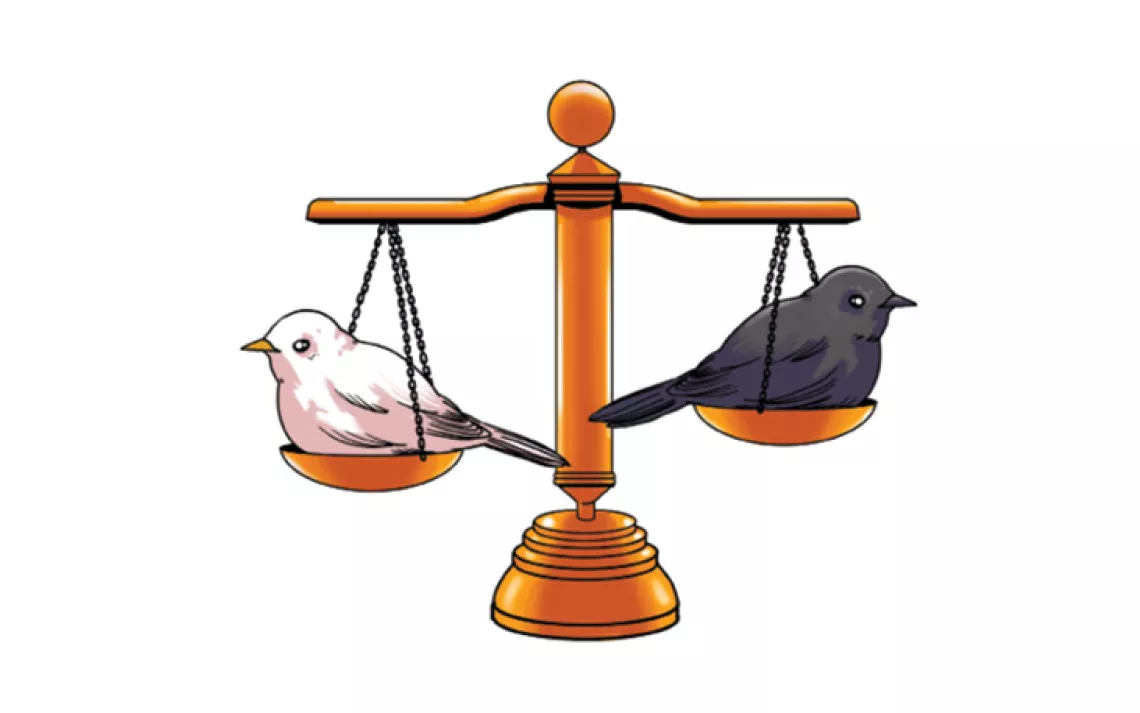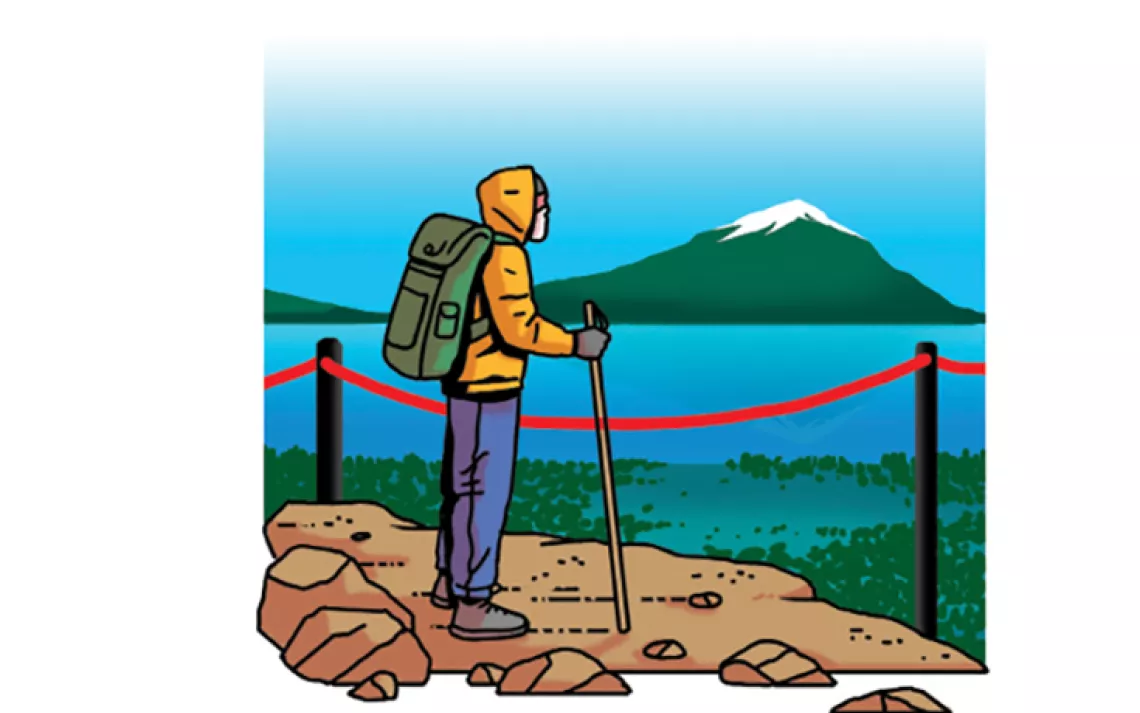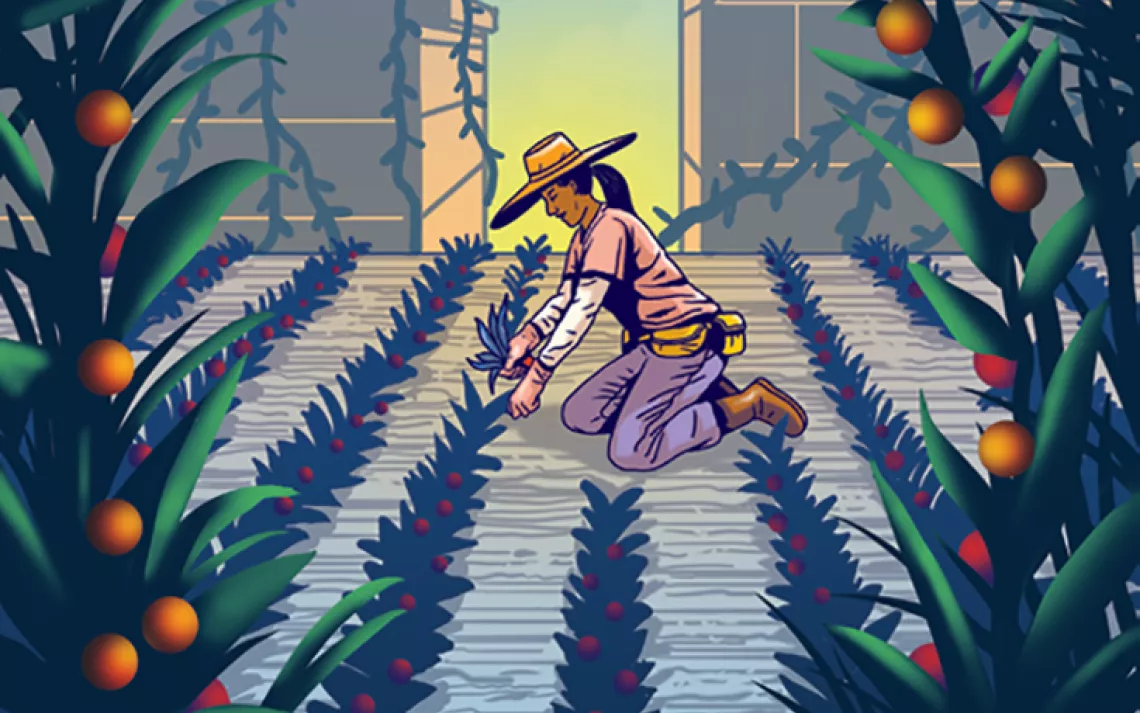The Best Rx for Environmental Health Disparities
The path to a healthier future: address environmental health risks today

Illustration by Glenn Harvey
Illustration by Glenn Harvey No one should be surprised to learn that higher rates of coronavirus infection and death have plagued the racially marginalized African American, Latino, and Native American communities. Other infectious scourges such as HIV and hepatitis C have shown a similar pattern.
Yet astonishment flared last April when data revealed that although African Americans constituted 13 percent of the population, they accounted for approximately 40 percent of reported COVID-19 cases. Twitter users proffered familiar theories to explain it. On April 4, Robert Fiore—whose MAGA-hashtag-adorned profile identified him as vice president of Manhattan's GOP—asked, "Is it about race or obesity? It would seem that obese people fair [sic] worse. Also males as well as people who smoke and drink alcohol." Another tweet attributed the disparity to "economic disadvantage" and "where people choose to live," and others were quick to posit, without evidence, a penchant for lawbreaking as signaled by a flouting of social-distancing mandates. Some respondents swiftly invoked criminal propensities to explain the disproportionate infection rates: "Compare areas with high crime rates to areas with high COVID-19 cases. I imagine the areas would match because the lack of respect for the law and how it relates to following the CDC guidelines."
Within minutes, Twitter's social microcosm showcased a persistent pattern that also dominated news accounts, medical reports, and wider public discourse. The responses ignored or denied racially disparate treatment as a factor and instead blamed people of color for their own disease. African Americans, Latinos, and Native Americans supposedly courted their own illness by being obese; by smoking, drinking, and using drugs; by choosing crumbling tenements and vermin-infested public housing over suburban bedroom communities; and by ignoring social distancing and, by extension, the law as they ventured out and congregated daily.
US history has often featured this criminalization of infection. I thought of the American School of Ethnology, those 19th-century scientists and their ilk who first described African Americans as being inferior, unintelligent, disease-prone, drug-and-alcohol-swilling, and inherently criminal types who failed to take precautions against diseases and, in so doing, spread them widely. For these Victorian scientists, the shockingly high infant mortality rate of the enslaved was the direct result not of the peculiar institution's starvation, physical labor, untreated diseases, and draconian punishments but rather of Black parents' abuse and neglect.
The era's physicians called pellagra a Black infectious disease that struck only African Americans because of their penchant for living in filthy, crowded conditions. Only in 1920 did research by Joseph Goldberger reveal it as a deficiency disease, linking it to the malnutrition that had been so common during enslavement.
Today's finger-pointing discourse echoes the ideology of those long-dead scientists. The only way we can build a healthy future for everyone is if we understand, and grapple with, the injustices of the past and present.
Obesity, with its attendant implications of laziness and poor self-control, is routinely invoked to explain racial vulnerability to COVID-19. The same claim—that obesity elevates the risk of death—was raised after the H1N1 (swine flu) outbreak, but it was later proved incorrect when data analysis showed that the obese suffered no increased risk of death and in fact were less likely to die than others (yet were less likely to be afforded certain care, such as access to ventilators). Even should data reveal that obesity—and not the poorer treatment afforded to the obese—is indeed a risk factor for COVID-19, we must remember that living in food swamps, where nutritional food is sparse and expensive, increases people's dependence on fatty, sugary fast foods and raises their body mass index. Food swamps also foment the vitamin C and D deficiencies that are known risk factors for COVID-19.
The harms from exposure to environmental toxics go far beyond COVID-19. Air pollution abets kidney and heart disease; lead exposure increases vulnerability to other viral infections. Although some suggest that these environmental risk factors are driven by economics, racism is responsible: A 2008 study determined that African Americans with an annual average income between $50,000 and $60,000 are exposed to more pollution than are white households with an average income of below $10,000.
Environmental racism wreaks mental and psychological havoc upon communities of color—an ongoing public health disaster that the mainstream medical system has largely ignored. Heavy-metal exposures, iodine and other nutritional deficiencies, and consumption of mercury-tainted fish cause neurological syndromes and developmental delays. American children lose up to 23 million IQ points a year to lead poisoning alone, leading to failures in school and in life and to heightened incarceration rates. High US crime rates have been tied to areas with high rates of lead exposure from interior paint and gasoline.
We know that pollution lies behind this freight of neurological, mental, and behavioral illnesses; we can prevent and treat them. And we've long known how to do it. For example, we can craft prenatal counseling protocols for pregnant women to educate them about mercury exposure at a nominal cost.
The key to preventing these illnesses in the future is to aggressively address environmental health risks today. Instead of blaming people of color for illusory and stigmatizing drug use, smoking, and drinking, we should devise holistic treatment models that take into account the environmental pollution that may be the basis for poor health.
We also need a strong federal watchdog dedicated to protecting communities from environmental hazards. That begins with revitalizing the Environmental Protection Agency, which is in shambles thanks to the Trump administration. Trump and his allies rolled back dozens of protections that had blocked big polluters from exposing people to carbon dioxide, methane, mercury, and other emissions long known to be responsible for major public health effects, such as cardiovascular disease, neurological disorders, and strokes. Prior to the Trump administration, the EPA had a long history of successfully targeting the purveyors of environmental poisons by enforcing industry standards, replete with government surveillance and penalties. It's time to rebuild them.
Eliminating environmental racism's shameful inequity also requires confronting and correcting the health-care faultlines that shape it. We must nurture a society in which we address and treat all patients with the same respect and care. Racism, not race, is the problem. We know that people of color are less likely to have personal physicians or health insurance and are more likely to live where "safety net" hospitals have closed down. When they do access health care, they are less likely to have their symptoms acknowledged and acted upon appropriately or to have their pain treated.
To remedy this, health insurance should be extended to all, and the government should invest in keeping local hospitals open. We can begin by extending health care to all the essential workers who are being forced to forgo social distancing.
Fortunately, as one of the world's wealthiest nations, we have the solution to medical inequity, and we have the means. We just need the political will.
This article appeared in the January/February edition with the headline "Rx for Environmental Health Disparities."
 The Magazine of The Sierra Club
The Magazine of The Sierra Club



